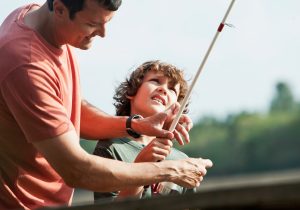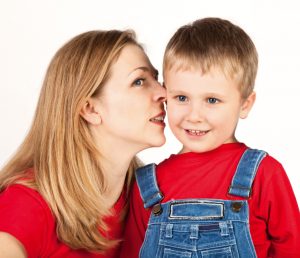The Key to Raising Independent, Capable Kids
Am I being nurturing or neglectful?
As parents, it can be challenging to find the line between caring for our children and doing too much for them. It can be equally tricky to know when encouraging them to do something on their own has crossed the line into not supporting them when they need us. Most parents spend a lot of time trying to strike some sort of balance. We leave many interactions with our children asking,”Am I being nurturing or neglectful? Am I under-doing or overstepping?”

I often say that parents are like a great platform from which our children can venture out and explore. By providing a safe base, our kids can go out into the world with a sense of inner security. This starts pretty much the minute our kids can crawl or take their first wobbly steps away from us. Our job is to allow this exploration. The trick is, the minute they feel frightened, anxious, or uncertain, they know they can come back to us for comfort.
As our kids get older and become more independent, we too have to transition into different roles, teaching and supporting their independence, while continuing to be a secure base. For all parents of children of all ages struggling with these transitions, there are some valuable principles that can help both you and your children develop and thrive.
Transitioning Into Different Roles
The first thing we can do is include them in projects and offer them responsibility. I recently read the actor Will Smith’s autobiography in which he shared a story of his father telling him and his brothers they were going to build the walls of the family’s new store. At first, the kids felt overwhelmed by this suggestion. How could we possibly build a wall? We’re just kids! It will take forever. However, after teaching them how to lay a brick, his dad told them don’t worry about the wall. Just focus on showing up each day and laying each brick, one by one. Eventually, the store was built.
This idea of giving our kids manageable responsibilities and encouraging them to take steps rather than expecting them to accomplish huge feats is a powerful lesson to offer. Our children’s brains are wiring at an incredibly rapid pace, and it’s easy for the world to feel overwhelming to them. While we don’t want to pile on mounds of pressure, we undermine their confidence when we deny them the opportunity that comes with responsibility.
In her classic book, Bird by Bird: Some Instructions on Writing and Life, Anne Lamott wrote:
Thirty years ago my older brother, who was ten years old at the time, was trying to get a report on birds written that he’d had three months to write. [It] was due the next day. We were out at our family cabin in Bolinas, and he was at the kitchen table close to tears, surrounded by binder paper and pencils and unopened books on birds, immobilized by the hugeness of the task ahead. Then my father sat down beside him, put his arm around my brother’s shoulder, and said. “Bird by bird, buddy. Just take it bird by bird.”
By helping our children focus on small, yet significant steps, (e.g. studying for one test, rather than worrying about their overall class grade) we encourage focus and growth. We can also include them in our lives, having them help out in ways that are natural and that benefit those around them. In making them a part of the daily tasks that make their lives comfortable, be it setting the table, planting a garden, or building a wall, we consistently allow them to enjoy and reflect on what they achieved.
A sense of accomplishment isn’t something a parent can manufacture. We have to provide opportunities for responsibility and have trust in our child. This has nothing to do with build up or praise but a basic belief in their ability that they themselves can connect to by accomplishing tasks, brick by brick or bird by bird.
Our Children Are Not Us
The second thing we should keep in mind is that no matter what, our children are not us. When we give our kids responsibility or set them on a path to achieve certain goals, we must all along ask ourselves who these goals belong to and who they serve. Very often, we project our own wants, needs, and experiences onto our kids. We may want a laundry list of things for them that we never had, or we may rely on them to accomplish things we never could. It may not sound so bad to want our child to have it better than us, but when we view our children as duplicates of ourselves, we are, most likely, not be seeing them for who they are.
The risk of attempting to re-raise our child selves rather than raising the person our child is is that we may not be attuned to their unique qualities and aspirations. What we perceive as nurturing or encouraging behavior may not be supporting our child’s natural strengths and desires. Making them play an instrument, for example, may seem like something they’ll thank us for one day, but we have to ask ourselves, “Is this about them learning a useful skill or about us needing to be the parent of someone who plays a musical instrument?”
In order to raise a capable and confident person, we have to be awake to the things that light our children up. Where do their natural abilities and interests lie? Which of those are unique to them and different from ours? Being open to these things helps us connect to the parts of our children that could use nurturing and support. Again, this shouldn’t be confused with pressure. This is about being attuned to our kids, while they’re exploring and discovering themselves.
Once a child has identified something that captures their interest or imagination, be it a sport, an art form, or a subject in school, we can help clear a path for them to pursue it. We can help them stick with it by shifting their focus on those step-by-step goals and allowing them to enjoy the process.
Raising a child, as they go from being fully dependent to independent, brings up all kinds of instincts and emotions. Finding a sweet spot short of over-pressuring, over-praising, or over-doing for our child takes patience and introspection. As parents, we should practice self-compassion and take time to separate the lessons we want our child to learn for themselves from the ones that come from our own complicated expectations. When we see the goal as our child feeling supported in being themselves, while having their own compassion and sense of responsibility, we can be a solid source of support. We can keep taking steps right alongside them, both of us building and both growing.

In this Webinar: When it comes to parenting advice, it can feel like there are just too many cooks in the kitchen. From…
Tags: child development, good parenting, helicopter parents, how to support kids, over-parent, over-parenting, parenting, parenting advice, raising independent kids, raising kids, responsible kids









